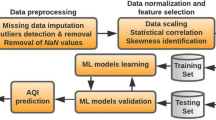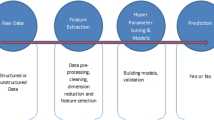Abstract
The effective management of seasonal dengue fever and other viral diseases fever such as malaria, pneumonia, and typhoid fever requires the early deployment of control measures. Predicting disease outbreaks accurately can aid in gaining control of epidemic seasons. In this research, a machine learning-based prediction model is suggested for predicting seasonality diseases. The model uses real-time data collected from different regions around Madurai district between 2019 and 2020, with 29 features including illness such as dengue, malaria, pneumonia, typhoid, kala-azar, Japanese encephalitis, measles, and normal fever and cold infections. The proposed model is a hybrid approach that includes feature selection using the Antlion Optimization Algorithm (ALO) and classification using Random Forest (RF) integrated with the XG-Boost technique. The suggested model’s efficiency is examined by accuracy, precision, recall, specificity, and f1-score as performance metrics, and compared with other models such as ACO-ANN, PSO-RF, WO-RF, and ANOVA-SVM. The suggested framework attained a high level of precision of 96.17%, a precision of 93.95%, a recall of 95.86%, a specificity of 93.23%, and an f1-score of 96.22%. Based on the comparison, the suggested model surpassed the eficiency of the alternative methods compared models in terms of all the parameters.











Similar content being viewed by others
References
Arquam M, Singh A, Cherifi H (2020) Impact of seasonal condition on vector-borne epidemiological dynamics. IEEE Access 8:94510–94525
Bhatnagar S, Lal V, Gupta SD, Gupta OP (2012) Forecasting incidences of dengue in Rajasthan, using time series analyses. Indian J Public Health 56(4):281
Davi C et al (2019) Severe dengue prognosis using human genome data and machine learning. IEEE Trans on Biomed Eng 66(10):2861–2868
Dutta P, Paul S, Obaid AJ, Pal S, Mukhopadhyay K (2021) Feature selections based artificial intelligence technique for the predictions of COVID like diseases. J Phys Conf Ser 1963(1):012167
Gambhir S, Malik SK, Kumar Y (2017) PSO-ANN based diagnostics model for the early detections of dengue diseases. New Horizons Transl Med 4(1–4):1–8
Gambhir S, Malik SK, Kumar Y (2018) The diagnosis of dengue disease: an evaluation of three machine learning approaches. International Journal of Healthcare Information Systems and Informatics (IJHISI) 13(3):1–19
Gothai E, Natesan P, Rajalaxmi RR, Vignesh T, Srinithy K, Balaji TV (2021) Predictive analysis in determining the dissemination of infectious disease and its severity. In 2021 5th International Conference on Computing Methodologies and Communication (ICCMC) (pp. 1556–1562). IEEE
Grampurohit S, Sagarnal C (2020) Disease predictions using machine learning algorithm, In International Conferences for Emerging Technology (INCET), pp. 1–7
Indhumathi K, Kumar KS (2021) A review on prediction of seasonal disease based on climate change using big data. Mater Today: Proceed 37:2648–2652
Iqbal N, Islam M (2017) Machine learning for dengue outbreak predictions: an outlook. Int J Adv Res Comput Sci 8(1):93–102
Martinez ME (2018) The calendar of epidemics: seasonal cycle of infectious diseases. PLoS Pathog 14(11):e1007327
Miyashita K, Nakatani E, Hozumi H, Sato Y, Miyachi Y, Suda T (2021) Risk factors for pneumonia and death in adult patients with seasonal influenza and establishment of prediction scores: a population-based study. In Open Forum Infectious Diseases 8(3):ofab068. Oxford University Press, New York
Mussumeci E, Coelho FC (2020) Large-scale multivariate forecasting model for dengue-LSTM versus random forest regressions. Spat Spatio-Temporal Epidemiol 35:100372
Nasiri H, Alavi SA (2021) A novel framework based on deep learning and ANOVA feature selections method for diagnosis of COVID-19 cases from chest X-ray Images, arXiv preprint arXiv:2110.06340
Rodó X, Pascual M, Doblas-Reyes FJ, Gershunov A, Stone DA, Giorgi F, Hudson PJ, Kinter J, Rodríguez-Arias MÀ, Stenseth NC, Alonso D (2013) Climate change and infectious diseases: can we meet the needs for better prediction? Climatic change 118:625–640
Sandhu AK, Batth RS (2021) Software reuse analytics using integrated random forest and gradient boosting machine learning algorithms. Softw Pract Exp 51(4):735–747
Sharma N, Dev J, Mangla M, Wadhwa VM, Mohanty SN, Kakkar D (2021) A heterogeneous ensemble forecasting model for disease prediction. New Generation Computing, pp 1–15
Tran TQ, Sakuma J (2019) Seasonal-adjustment Based Feature Selections Method for Predicting Epidemic with Large-scale Search Engine Log, In Proceeding of the 25th ACM SIGKDD International Conferences on Knowledge Discovery & Data Mining, pp. 2857–2866
Zawbaa HM, Emary E, Parv B (2015) Feature selection based on antlion optimization algorithm. In 2015 Third world conference on complex systems (WCCS) (pp. 1–7). IEEE
Acknowledgements
There is no acknowledgement involved in this work.
Funding
No funding is involved in this work.
Author information
Authors and Affiliations
Contributions
There is no authorship contribution.
Corresponding author
Ethics declarations
Ethics approval and consent to participate
No participation of humans takes place in this implementation process.
Human and animal rights
No violation of Human and Animal Rights is involved.
Conflict of interest
Conflict of Interest is not applicable in this work.
Additional information
Publisher’s note
Springer Nature remains neutral with regard to jurisdictional claims in published maps and institutional affiliations.
Rights and permissions
Springer Nature or its licensor (e.g. a society or other partner) holds exclusive rights to this article under a publishing agreement with the author(s) or other rightsholder(s); author self-archiving of the accepted manuscript version of this article is solely governed by the terms of such publishing agreement and applicable law.
About this article
Cite this article
Indhumathi, K., Satheshkumar, K. Prediction of seasonal infectious diseases based on hybrid machine learning approach. Multimed Tools Appl 83, 7001–7019 (2024). https://doi.org/10.1007/s11042-023-15929-2
Received:
Revised:
Accepted:
Published:
Issue Date:
DOI: https://doi.org/10.1007/s11042-023-15929-2




